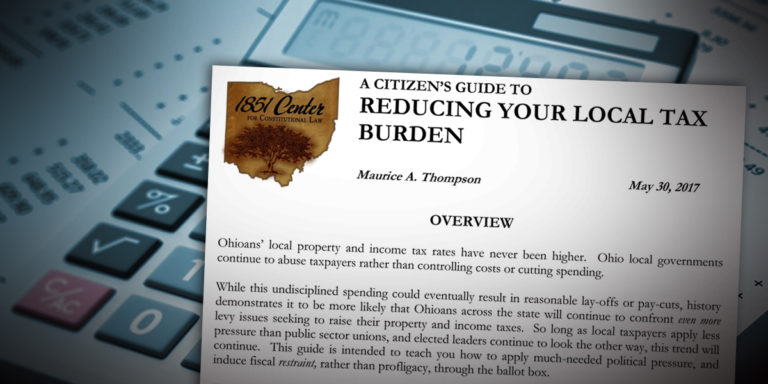Supreme Court Argument: Are Ohio’s Political Speech Regulations Constitutional?
1851 Center amicus brief maintains that political class uses elections commission and its regulations to attack grass-roots citizen activity
Columbus, OH – The United States Supreme Court heard oral arguments on Susan B. Anthony List v. Driehaus – whether Ohioans can stop the enforcement actions of the Ohio Elections Commission, and further, whether regulations prohibiting “false statements” regarding “public officials” or “candidates” violate the First Amendment to the United States Constitution.
Elections Commissions actions are often filed by well-heeled political veterans such as incumbents and well-financed campaigns, to intimidate and squelch the speech of political rivals and dissenters. These legal actions are often effective, since political novices with little money are unable to travel to Columbus and hire a lawyer to defend themselves at multiple lengthy Commission hearings.
The 1851 Center for Constitutional Law filed an amicus curiae brief in this case on behalf of numerous Ohioans who have been frivolously forced to appear before the Commission to defend their political speech.
The 1851 Center Brief explains and argues as follows:
- “Ohio’s Statute allows a politically-interested party to file a complaint against another, no matter whether the respondent’s speech is true or not,” meaning that “Ohioans have consistently faced commission hearings and even potential fines and criminal penalties in response to clearly-protected core political speech.”
- “Ohio maintains an administrative scheme that, on the premise of policing only intentionally false speech, subjects political speech to harassment.”
The brief recounts Ohio cases where Congressman Pat Tiberi’s affiliates filed an action to silence a primary opponent who was mocking his voting record; where Congressman Latta filed an action to silence those indicating that he “has a record of supporting higher taxes”; where a favored candidate who lost a township trustee election sued those who chatted on Facebook about whether the candidate was a “pornographer”; where a powerful ballot issue effort sued a citizen who criticized a government light rail plan as “one of the worst plans in the country”; where a township trustee alleged that his opponent was not truly an “organic” farmer; and numerous cases where upstart local candidates simply omitted the word “for” in their campaign literature (“John Smith, Treasurer” vs. “John Smith for Treasurer”).
“A common question asked regarding this case is whether the 1851 Center and others are defending a ‘right to lie.’ The answer is ‘no.’ Our efforts here are aimed at defending Ohioans from a panel of state government bureaucrats empowered to arbitrate what is true and what is false, in the realm of political debate,” according to Maurice Thompson, Executive Director of the 1851 Center.
“Our view, based on our experience litigating these type of cases, is that a government Commission cannot be trusted to accurately distinguish true political speech from false speech; and further, citizens need breathing space to criticize public officials, without concern that those officials will turn around and sue them for cavalier statements.”
“The Supreme Court has repeatedly confirmed that “in the free society ordained by our Constitution, it is not the government, but the people individually as citizens and candidates who must retain control over the quantity and range of debate on public issues.”
In addition to the 1851 Center’s amicus brief, 1851 Center Chairman Bradley Smith has filed an amicus brief, and 1851 Center Board Member Christopher Finney is amongst the attorneys challenging the statute.
Tune in for the oral argument live, at 10:00am on Tuesday April 22, or listen to the archived oral argument later, HERE.
Read the 1851 Center’s Amicus Brief HERE.

April 22, 2014: WSPD AM 1370: Constitutionality of Ohio Campaign Law Heard By Supreme Court
April 22, 2014: WBNS-10TV: U.S. Supreme Court To Determine Whether Ohio Candidates Can Lie












Leave a Reply
Want to join the discussion?Feel free to contribute!